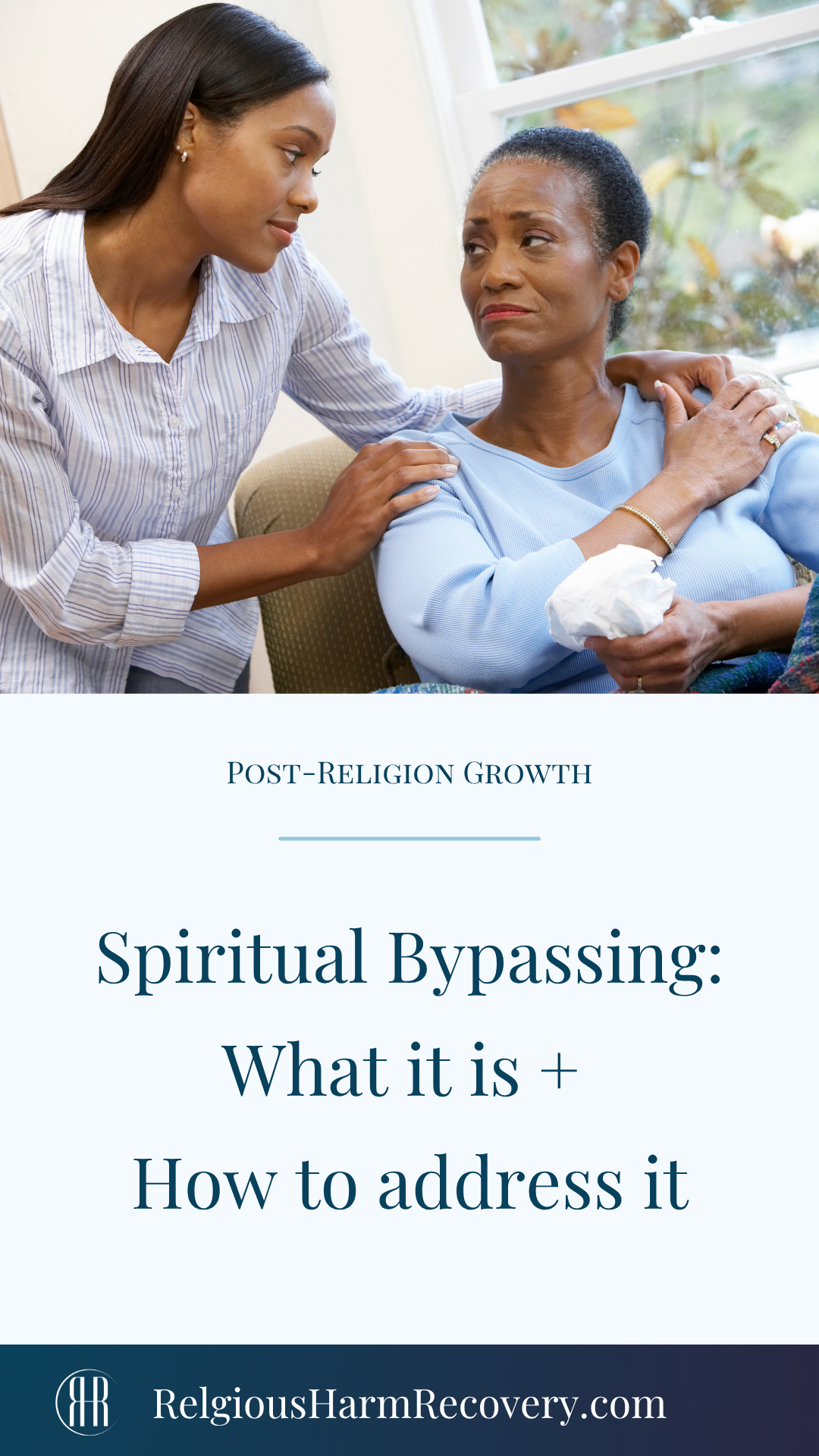Spiritual Bypassing: What It Is + How to Address It

Spiritual bypassing is the tendency to use spirituality or religious beliefs to avoid addressing unresolved emotional issues.
Psychologist John Welwood, who coined the term in the early 1980s, described it as “a tendency to use spiritual ideas and practices to sidestep or avoid facing unresolved emotional issues, psychological wounds, and unfinished developmental tasks.”
In many cases, spiritual bypassing becomes a way to escape difficult circumstances or the discomfort of growth.
It often looks like either suppressing something “bad” or overemphasizing something “good,” which creates the illusion of peace while bypassing pain.
What We’ll Be Covering:
Why People Spiritually Bypass
There are a couple reasons people tend to engage in spiritual bypassing.
The first is that it is a coping tool in the face of complex emotions and the second is that it feels like a solution to deep emotional wounds.
Let’s look at each in a bit more detail.
Spiritual Bypassing As a Coping Strategy
If you know someone who does a lot of spiritual bypassing, chances are probably high that they either have a low tolerance for emotional pain, or they’ve never developed the resources to navigate emotional pain in a healthy way.
For someone like this, spiritual bypassing is used as a protective strategy to avoid emotional pain in either themselves or others.
Spiritual bypassing shows up quite often in high-control religions because these groups expect folks to prioritize faith over feelings and obedience over questions.
When we’re told that doubt is dangerous, that anger is sinful, or that suffering is part of god’s plan, we learn to suppress anything that doesn’t “sound spiritual.”
Because folks are actively disconnected from their emotional world, the only way to deal with what’s happening is to outsource the emotion to a divine presence or deity who supposedly has the ultimate control.
Over time, this outsourcing (a.k.a. spiritual bypassing) can become the default way of coping with anything from a minor annoyance to complicated grief.
But spiritual bypassing doesn’t always look like avoidance. Sometimes, it’s mistaken for doing the work.
Spiritual Bypassing As a Misguided Approach to Healing
Spiritual bypassing also comes from a misunderstanding of what healing actually looks like.
It’s easy to confuse “feeling spiritual” with being well.
But true healing often looks messy, emotional, and uncomfortable.
In general, people struggle with sitting in the messy middle of the healing process, but folks who exist inside a high control religion typically aren’t even given the option of being in this space.
Because many high-control religions are very appearance-oriented, being connected to god or the holy spirit means maintaining an appearance of being at peace or joy-filled at all times.
When people in these spaces practice spiritual bypassing, they may actually confuse what they’re doing with deeper healing work; whereas, the reality is that they’ve simply become disconnected from their emotional pain.
Common Examples of Spiritual Bypassing
Spiritual bypassing is known to appear in all kinds of religious communities, but it’s especially common in high-control groups where emotional suppression is the norm.
We even see it in many new age spiritual communities that place a strong emphasis on “positive vibrations” as well as in the general cultural propensity in the U.S. towards a mentality of “toxic positivity.”
Example of Spiritual Bypassing:
Here’s the thing, while it can certainly be beneficial to have a positive mindset, spiritual bypassing ends up glossing over very real pain and suffering in a way that is ultimately harmful to people’s mental and emotional health.
In all of the above examples, the common thread is a tendency to use a religious or spiritual platitude as a way to avoid the messy and uncomfortable aspects of the human experience.
It also hinders genuine emotional support, empathy, and understanding.
So instead of providing comfort, these responses may inadvertently contribute to feelings of isolation, frustration, or inadequacy in the person facing a difficult situation.
9 Types of Spiritual Bypassing
As a quick recap, spiritual bypassing is using spirituality or religious beliefs to avoid unresolved emotional issues, sidestep difficult circumstances, or avoid personal growth.
Below are 9 common types of spiritual bypassing I see, both within high-control religious spaces and outside of formal religion, especially in wellness or “positive vibes only” culture.
Recognizing these patterns can help you reconnect with your own emotional world, but it can also keep you from unintentionally brushing past someone else’s pain when what they really need is compassion.
1. Denial of “Negative” Emotions
When someone downplays or denies emotions like anger, fear, or grief because they believe they should always remain positive or focused on God’s “blessings,” they’re engaging in spiritual bypassing.
This often looks like surface-level peace or joy that covers up inner distress.
Over time, this can lead to emotional repression and a loss of connection with what’s actually going on internally.
2. Hyper-Fixating on God’s “Goodness”
Some people respond to hardship by doubling down on praise, gratitude, or rehearsing God’s promises.
While those practices can feel comforting, they’re typically used to avoid the pain or even the awareness of deeper emotional wounds.
Someone who practices this type of spiritual bypassing may appear strong, but underneath, there’s often emotional dissociation or unresolved grief that hasn’t been addressed.
3. Avoidance of Conflict
Avoiding hard conversations in the name of being “Christlike” or “at peace” is another form of bypassing.
It often sounds like “turn the other cheek” or “God will deal with them” instead of addressing a problem directly.
This can create an unhealthy dynamic where harmful behavior goes unchallenged and accountability is avoided under the guise of being spiritually mature.
4. Over-Reliance on Rituals
When someone turns to prayer, worship, fasting, or saying a mantra every time they feel distress instead of facing their emotional pain directly, they may be spiritually bypassing.
These practices can feel soothing in the moment, but without emotional self-awareness, they can become a way to escape rather than heal.
Eventually, the person may become dependent on spiritual rituals for relief without doing the deeper work of healing.
5. Conflating Mental Health and Spirituality
This form of bypassing shows up when people view anxiety, depression, or trauma responses as purely “spiritual problems.”
Comments like “you just need more faith,” “you’re not right with God,” or “this is a result of negative thinking” shame people for having very human experiences.
This creates a damaging stigma around mental health and often keeps people from seeking therapy, medication, or emotional support.
6. Quoting Scripture to Avoid Discomfort
Sometimes people use Bible verses or religious phrases to shut down hard conversations.
It might sound like “lean not on your own understanding” or “God works all things for good” when someone brings up something painful.
While scripture can be comforting, using it to avoid discomfort or emotional honesty doesn’t bring healing.
It often makes the person on the receiving end feel dismissed or silenced.
7. Spiritualizing Harm or Injustice
This type of bypassing happens when people explain away harm as “part of God’s plan” or a necessary lesson from “the Universe.”
They might say things like “God is refining you” or “this will make you stronger.”
While these phrases may seem encouraging, they can minimize someone’s pain and pressure them to find meaning in situations that are genuinely harmful or traumatic.
8. Over-Identifying with a Spiritual Identity
When someone says “I’m a new creation, that doesn’t affect me anymore” or “I’ve forgiven and moved on,” it can sometimes be a way to bypass the real work of healing or repair.
They may believe that claiming a spiritual identity is the same as doing the emotional work, but this can lead to unresolved issues being buried instead of processed.
It can also harm relationships if the past is being brushed aside without mutual acknowledgment or closure.
9. Positivity Culture in Spiritual Disguise
Messages like “the universe is conspiring in your favor” or “good vibes only” may sound empowering, but they can shut down real emotional processing.
This version of bypassing is especially common in new age and self-help spaces.
It pressures people to suppress anything uncomfortable and often leaves them feeling isolated when their reality doesn’t match the spiritual ideal.

Coping Without Spiritual Bypassing
For those of us raised in high-control religions, we may still default to spiritual bypassing without even realizing it.
When I left evangelical Christianity, I found myself drawn to a softer, more flexible spirituality.
But there were definitely times I was still using it to avoid emotional pain, especially as I fell into the positive thoughts cause good things to happen and negative thoughts cause bad things to happen.
I see this happen with a lot of people.
This is why it’s important to recognize that spiritual bypassing isn’t always about dogma.
Oftentimes, it’s about comfort. However, comfort can easily turn into avoidance.
If you’ve noticed this pattern in yourself, here are some strategies to help you stay grounded in your emotional reality rather than slipping into spiritual bypassing.
Acknowledge and Accept Your Feelings
Start by naming what you feel (e.g. anger, grief, fear, jealousy, or even numbness) without rushing to fix or reframe it.
These emotions aren’t bad. They’re part of being human.
Letting yourself truly feel and experience your feelings is the opposite of avoidance.
It’s the foundation of healing.
Practice Mindful Awareness
Mindfulness helps you become more aware of your thoughts and emotions as they show up.
That awareness gives you a chance to respond with care rather than reacting automatically.
You can try a body scan, focused breathing, or simply noticing where a feeling lands in your body.
This builds emotional tolerance over time.
Separate Spiritual Support from Emotional Healing
Spirituality can be deeply supportive during hard times, but it isn’t a substitute for doing emotional work.
If you’re using spiritual practices to avoid grief, anger, or relational repair, try asking yourself, “Am I engaging with this pain, or trying to make it go away?”
That kind of pause can be the difference between slipping into spiritual bypassing and doing the important work of attuning to your emotional world.
Use Rituals to Honor Emotions, Not Avoid Them
If prayer or worship was your go-to in times of distress, you can still create rituals that support you.
Light a candle for grief. Write a letter to your younger self.
Make space for what you’re feeling instead of trying to override it with spiritual language or activity.
Reach Out for Support
There’s strength in seeking help.
A therapist, coach, or trusted peer can support you through painful emotions in ways that don’t rely on spiritual explanations.
Getting support outside of spiritual systems can help you develop language, skills, and emotional presence that lead to real healing.

How to Respond to Others Who are Spiritual Bypassing
It can be extremely frustrating to be in conversation or relationship with someone who defaults into spiritual bypassing, especially is their version of spiritual bypassing is triggering your religious trauma wounds.
And, if these comments are directed towards you or they’re a response to something painful you’re dealing with, it can be incredibly hurtful and invalidating.
Maybe it’s a friend who always says, “Everything happens for a reason,” when you’re grieving.
Maybe it’s a family member who quotes scripture instead of acknowledging what you’re actually feeling.
Or maybe it’s someone in your spiritual circle who insists on “good vibes only,” even when something genuinely hard is happening.
Because spiritual bypassing happens so frequently both inside and outside of high-control religions, I wanted to give you some tips on how to handle it when it does come it.
The following are a few ways to respond to spiritual bypassing without shutting down the relationship or betraying your own emotional reality.
Pause Before Reacting
If someone uses a spiritual phrase that feels dismissive or bypass-y, take a moment to pause.
You don’t need to respond right away or explain why it didn’t land well.
Give yourself a moment to notice your reaction and what you need before trying to correct or educate them.
Stay Grounded in Your Own Truth
You don’t have to argue or convince them to see things differently.
Instead, stay rooted in what’s true for you.
You might say something like:
This keeps the focus on your experience rather than trying to fix theirs.
Offer a Gentle Reframe (if appropriate)
If it feels safe and the relationship can hold it, you might invite them to go deeper. Not in a corrective way, but in a curious one.
For example:
Sometimes people are bypassing because they genuinely don’t know another way to be with pain.
You offering a different response can model something more emotionally honest.
Set a Boundary Around Religious Language
People who are still heavily indoctrinated tend to slip spiritual bypassing into nearly every conversation, but they especially do this to explain way challenging situations or gloss over authentic emotion.
If you have someone in your world whose default mode is spiritual bypassing, you might consider having a separate conversation asking them to not use religious language in their conversations with you.
Consider how you’ll handle it if they continue to use this type of language despite your request.
Will you:
Protect Your Energy
If spiritual bypassing is a regular part of your family or church culture, you may need to limit your exposure to certain conversations or people when you’re going through something raw.
This isn’t about cutting people off. It’s about honoring the space you need to heal.
It’s okay to avoid certain settings or excuse yourself from conversations where your pain isn’t being met with presence or care.
This doesn’t have to be a permanent shift, but it might need to be what happens for a period of time.
Don’t Feel Obligated to Educate Everyone
You are not responsible for teaching everyone the difference between empathy and bypassing.
Especially when you’re the one hurting, it’s okay to prioritize your emotional well-being over someone else’s learning moment.
You can always come back to the conversation later if you want to.
Reflect with Compassion
It helps to remember that most people who use spiritual bypassing learned it as a coping strategy or were indoctrinated to engage with the world in this way.
And in general, many folks have never been taught how to hold space for pain without rushing to fix it.
This doesn’t excuse harmful responses, but it can help soften your own internal reaction so you don’t carry extra weight that isn’t yours to hold.
Final Thoughts
To sum it up… spiritual bypassing is a complex and often unconscious pattern that many of us learned in religious spaces.
While it can feel comforting in the moment, true healing comes from allowing ourselves to fully experience our emotions and human experiences.
By staying aware of these patterns and practicing the strategies above, you can develop a more authentic relationship with both your spirituality and your emotional reality.
Some Possible Next Steps:
If this article resonated with you and you’re looking to go deeper, here are a few things that may help:
Related Articles
-
How Loyalty to a Narcissistic God Damages Mental Health
It’s common knowledge that narcissists can take a real toll on the mental health of those they’re close to, but have you considered that perhaps the god you once served was a narcissist?
-
Understanding Religious Cult Programming + How to Recover
This article provides a detailed overview of how religious cults use programming techniques to control their members, and it also breaks down some effective strategies for deprogramming and recovery.
-
7 Subtle Signs of Spiritual Abuse
When I first began to deconstruct my faith, I struggled to make sense of my experiences. I struggled because nothing in my religious past seemed to fit the conventional idea of trauma or abuse. I hadn’t been physically or verbally…
